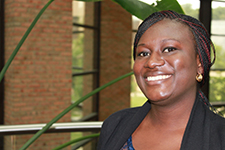
When Mariam Boakye-Gyasi was 3 years old, she caught a severe case of malaria that caused her small body to convulse so violently that her parents were afraid she would break her teeth. She was lucky to survive because every minute, the illness kills a child in the world—mostly in Africa.
violently that her parents were afraid she would break her teeth. She was lucky to survive because every minute, the illness kills a child in the world—mostly in Africa.
Boakye-Gyasi wants to fight the disease, so the lecturer and doctoral student from Ghana is spending the fall semester at the University of Michigan researching new ways to administer antimalarial drugs that could save millions of lives.
“It’s so sad. Malaria is killing a lot of people in Ghana, and it shouldn’t be,” said Boakye-Gyasi, who is studying pharmaceutics at Kwame Nkrumah University of Science and Technology.
Boakye-Gyasi is part of the U-M African Presidential Scholars program, which each year brings a group of early-career African faculty to U-M for four-to-six months. They do research, write, take classes, give talks, work with mentors and expand their professional networks.
U-M is the only major Western university that has such a program for African scholars from a wide variety of fields. The 15 academics in this year’s group have interests that range from distance learning and midwifery to water scarcity and the development of mining towns.
One of the fellows is Ignatius Ticha, who is interested in the depiction of poverty in African and Irish literature. During his time at U-M, the senior lecturer from Cape Peninsula University of Technology in South Africa hopes to write journal articles based on his dissertation, which focused on novels by Kenya’s Meja Mwangi and Ireland’s Roddy Doyle.
“The common perception associates poverty with India, Africa and other places,” said Ticha, originally from Cameroon. “I want to look at how poverty is a universal phenomenon, not just African.”
Another fellow, Linda Fondjo from Ghana, wants to spend her time at U-M building her research potential, learning methodologies in molecular biology that will advance her future research in female reproductive health.
“Not a lot of places in Ghana have the equipment that I need,” said Fondjo from Kwame Nkrumah University of Science and Technology. “At Michigan, I’ve got the impression that everyone is so willing to help and share information. People don’t hold back.”
Launched seven years ago, the program has helped several U-M professors establish collaborative relationships with African colleagues, said Kelly Askew, director of the African Studies Center.
When the fellows return to Africa, they become valuable resources for U-M faculty and students, helping to anchor the university’s education-abroad and research relationships in Africa, said Oveta Fuller, associate director of the African Studies Center.
“It makes a huge difference for researchers to know people on the ground with a network of contacts,” Fuller said.
Fellows in the UMAPS program have traditionally come from Ghana, Liberia, South Africa and Uganda. But beginning next year, scholars from other African countries who have established a relationship with a U-M faculty member can be nominated by that professor for the program.
During her months at U-M, Boakye-Gyasi, the malaria expert from Ghana, wants to develop a more affordable way to treat patients with severe malaria who can’t swallow pills because they’re convulsing, unconscious or throwing up.
One approach is to administer the drugs intravenously or intramuscularly. But this is impractical in rural areas in Ghana because there is a shortage of skilled medical workers who can administer injections. Midwives with limited training often treat malaria in the countryside, Boakye-Gyasi said.
“You don’t want to be given an injection from someone who doesn’t know the difference between a vein and an artery,” she said.
Another approach is administering the drugs through the rectum with suppositories. But suppositories are made with expensive synthetic “bases”—substances mixed with the medicine that help release it safely into the body, she said. The rural poor can’t afford the suppositories.
Boakye-Gyasi thinks the best solution is developing an antimalarial suppository with a base made from fat extracted from cocoa beans or nuts from the shea tree. Both are cheap and abundant in Ghana, and they melt at body temperature. She has already created a formulation and plans to do quality-control tests at U-M.
“Unfortunately, I don’t have all the equipment that I need in Ghana to assess the quality of my formulations,” Boakye-Gyasi said.
If she’s successful, the new suppositories could have a huge impact on treating malaria among the rural poor, making the drugs cheap and easy to use.
She said, “Even a mother would be able to administer the drugs for her child.”
List of current scholars and their mentors: http://bit.ly/Zh3dzf
Map of U-M’s engagement in Africa: http://global.umich.edu/worldwide/map


